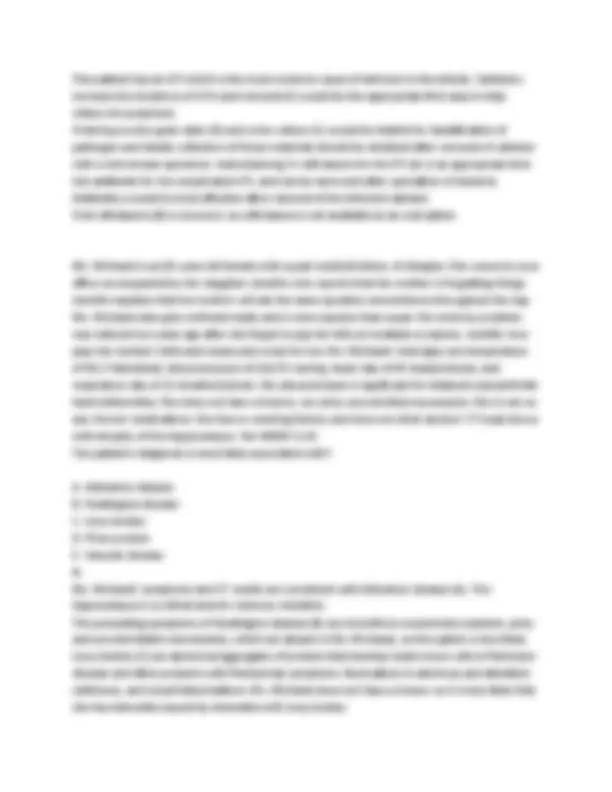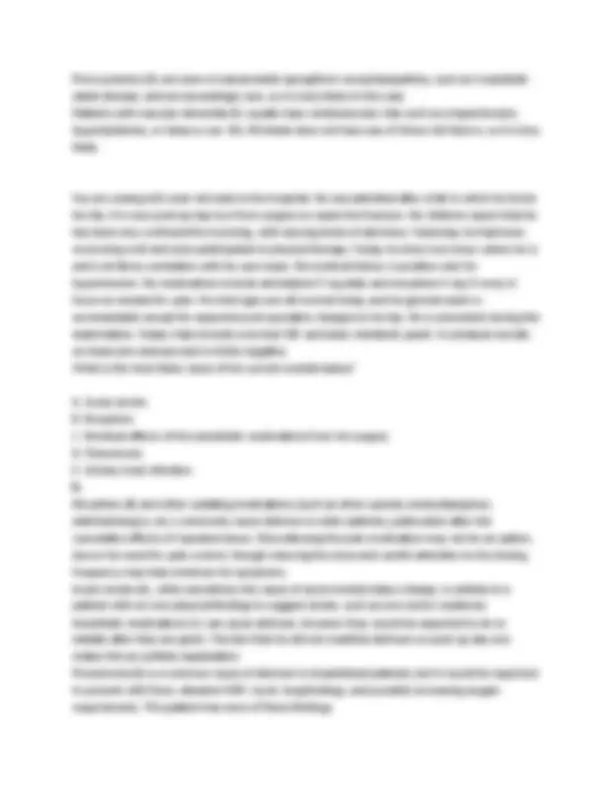





Study with the several resources on Docsity

Earn points by helping other students or get them with a premium plan


Prepare for your exams
Study with the several resources on Docsity

Earn points to download
Earn points by helping other students or get them with a premium plan
Community
Ask the community for help and clear up your study doubts
Discover the best universities in your country according to Docsity users
Free resources
Download our free guides on studying techniques, anxiety management strategies, and thesis advice from Docsity tutors
Dementia/Physical Aggression, Ron Jackson, 87 years old Ms. Martinez, a 74-year-old female, is brought to your clinic by her husband. He is concerned because his wife, who used to take pride in keeping the house in good shape, has stopped cleaning and caring for her appearance. She recently went shopping and left the stove on. She frequently misplaces her car keys and checkbook. Ms. Martinez reports trouble concentrating and does not have much energy. She has a poor appetite and no longer enjoys knitting. Her Mini-Mental State Examination (MMSE) is 28/30. Physical exam: General appearance: well-nourished, appears stated age; HEENT: pupils equal, round and reactive to light, moist mucus membranes; chest: normal S1 and S2, no murmurs; lungs: clear to auscultation bilaterally; abdomen: soft, non-tender, non-distended; extremities: no cyanosis, no clubbing; neurologic: no focal deficits; psychiatric: flat affect. Labs: TSH: 2; WBC: 6.0; HgbA1c: 4.5.
Typology: Exams
1 / 5

This page cannot be seen from the preview
Don't miss anything!




Ms. Martinez, a 74-year-old female, is brought to your clinic by her husband. He is concerned because his wife, who used to take pride in keeping the house in good shape, has stopped cleaning and caring for her appearance. She recently went shopping and left the stove on. She frequently misplaces her car keys and checkbook. Ms. Martinez reports trouble concentrating and does not have much energy. She has a poor appetite and no longer enjoys knitting. Her Mini-Mental State Examination (MMSE) is 28/30. Physical exam: General appearance: well- nourished, appears stated age; HEENT: pupils equal, round and reactive to light, moist mucus membranes; chest: normal S1 and S2, no murmurs; lungs: clear to auscultation bilaterally; abdomen: soft, non-tender, non-distended; extremities: no cyanosis, no clubbing; neurologic: no focal deficits; psychiatric: flat affect. Labs: TSH: 2; WBC: 6.0; HgbA1c: 4.5. Which of the following is the most likely diagnosis? A. Delirium B. Dementia C. Depression D. Hypoglycemia E. Normal bereavement C. Her exam findings are normal with the exception of her affect. This suggests a mood disorder such as depression (C). As there is nothing in the history to suggest a recent loss, bereavement (E) is less likely Ms. Martinez has a normal MMSE, so (B) is incorrect. Hypoglycemia (D) is less likely as Ms. Martinez does not have diabetes and is not on glucose- lowering medications. History is not suggestive of delirium (A), which would present with more fluctuations in symptoms and alteration in cognition. Ms. Brady, a 78-year-old female prevents to your office after six months for follow-up. Her interval history is significant for a TIA three months ago. Today her Mini-Mental State Examination (MMSE) is 19. You note that six months ago her MMSE was 22, and nine months ago it was 26. Physical exam shows temperature of 98.8 Fahrenheit, blood pressure of 167/ mmHg, heart rate of 76 beats/minute, respiratory rate of 14 breaths/minute, and BMI of 23.
Chest: regular rate and rhythm, no murmurs; lungs: clear to auscultation; neuro: weakness in the right upper extremity; abdomen: soft, non-tender. She takes atorvastatin and aspirin. Lab studies show Hgb A1c: 5, TSH: 3, B12: 500 pg/mL. Which of the following is the most important recommendation to prevent further disability in this patient? A. Order a mammogram B. Start hydrochlorothiazide C. Start metformin D. Start vegetarian diet E. Weight loss B. To prevent additional TIAs and stroke, her blood pressure needs to be controlled. Hydrochlorothiazide (B) is a reasonable first-line medication. A 78-year-old patient with cerebrovascular disease and evidence of moderate dementia (MMSE of 19) is likely to have a high risk of mortality within the next five years. In this setting, the benefit of screening for breast cancer (A) would be expected to be very low. Her HgbA1C is in the normal range so metformin (C) would not be an appropriate choice. A vegetarian diet (D) would have little impact on limiting dementia. Her BMI is 23, so weight loss (E) is not necessary at this point, and would likely not help with memory issues. A 68-year-old male becomes confused and agitated on post-operative day three after open cholecystectomy. He does not recall his surgery or where he is, and he wants to leave the hospital. Physical exam shows temperature of 99.9 Fahrenheit, blood pressure of 143/ mmHg, heart rate of 90 beats/minute, respiratory rate of 13 breaths/minute, and O2 sat of 98% on room air. He appears agitated and uncomfortable. He has a Foley catheter. His physical exam is unremarkable. Labs: WBC-11,000, Urinalysis: 2+ nitrites and 2+ leukocyte esterase, 10 WBC/hpf. Glucose finger stick: 80, ECG: normal sinus rhythm at 88 beats per minute. Which of the following is the best initial step to help relieve the patient's symptoms? A. Give IV ceftriaxone B. Give oral ceftriaxone C. Order urine culture D. Order urine gram stain E. Remove urine catheter E.
Prion proteins (D) are seen in transmissible spongiform encephalopathies, such as Creutzfeldt- Jakob disease, and are exceedingly rare, so it is less likely in this case. Patients with vascular dementia (E) usually have cardiovascular risks such as a hypertension, hyperlipidemia, or tobacco use. Ms. Michaels does not have any of these risk factors, so it is less likely. You are seeing a 92-year-old male in the hospital. He was admitted after a fall in which he broke his hip. It is now post-op day two from surgery to repair the fracture. His children report that he has been very confused this morning, with varying levels of alertness. Yesterday, he had been recovering well and even participated in physical therapy. Today, he does now know where he is and is at times combative with his care team. His medical history is positive only for hypertension. His medications include amlodipine 5 mg daily and morphine 4 mg IV every 4 hours as needed for pain. His vital signs are all normal today, and his general exam is unremarkable except for expected post-operative changes to his hip. He is somnolent during the examination. Today's labs include a normal CBC and basic metabolic panel. A urinalysis reveals no leukocyte esterase and is nitrite negative. What is the most likely cause of his current mental status? A. Acute stroke B. Morphine C. Residual effects of the anesthetic medications from his surgery D. Pneumonia E. Urinary tract infection B. Morphine (B) and other sedating medications (such as other opioids, benzodiazepines, anticholinergics, etc.) commonly cause delirium in older patients, particularly after the cumulative effects of repeated doses. Discontinuing the pain medication may not be an option, due to his need for pain control, though reducing the dose and careful attention to the dosing frequency may help minimize his symptoms. Acute stroke (A), while sometimes the cause of acute mental status change, is unlikely in a patient with no new physical findings to suggest stroke, such as new motor weakness. Anesthetic medications (C) can cause delirium, however they would be expected to do so initially after they are given. The fact that he did not manifest delirium on post-op day one makes this an unlikely explanation. Pneumonia (D) is a common cause of delirium in hospitalized patients, but it would be expected to present with fever, elevated WBC count, lung findings, and possibly increasing oxygen requirements. This patient has none of these findings.
A urinary tract infection (E), while common in post-operative patients, is less likely in a patient with a normal urinalysis.